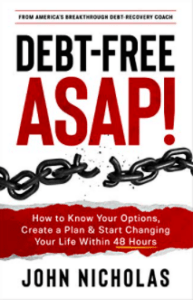The third Monday in January has been dubbed “Blue Monday.”
“The reasons are pretty simple: bad weather, barren trees, post-holiday hangovers and a lot of resolutions that have already gone bust. And then on top of those things you have your holiday bills landing and adding new debt on top of old,” said John Nicholas, the Dallas-based author of Debt-Free ASAP: How to Know Your Options, Create a Plan and Start Changing Your Life Within 48 Hours.
The financial landscape already is bleak for many American households, with the average household carrying $90,000 in debt, he said, much of it in credit card balances, bank loans and car notes.

John Nicholas
But the Ivy League-educated entrepreneur, former professional football player and Vineyard church pastor believes doing a bit of math and turning to prayer can transform the post-holiday blues into a positive experience. “When you have been alerted to the fact that this is a discouraging time of the year, it actually becomes the best time to take a look at your financial situation and to turn your game around.”
And bringing God into the mix is an important part of the equation, he said. “Getting prayer and faith involved is key to engaging a proactive, victorious spirit in putting a plan together and moving forward. It takes faith to open that drawer and to look at all the bills and compile a list and face the giant that is our debt.”
Nicholas comes to the debt-recovery space not only from proven financial prowess in real estate, investing, media, marketing and building companies worth millions, but also from a personally devastating experience with joblessness and crippling debt. It happened when the Emmy Award-winning sports media and marking firm he was leading cut him loose shortly after 9-11.
“It was disabling,” he recalled. “So, I am sensitive to the common causes of debt. Most of the time it’s not from free-wheeling spending but usually from job loss, health issues, limited income, divorce and, more recently, the impacts of COVID.”
While not billed as a faith-based approach to debt-reduction, Debt Free ASAP does recognize the spiritual impact debt can have on consumers, as well as the role faith can play in recovering.
Heavy debt not only can degrade financial, emotional and mental health, but also a consumer’s spiritual condition, said Nicholas, a Fuller Seminary graduate who spent most of the 1990s leading a California congregation.
“Debt is the opposite of freedom and abundance, which are the ultimate states of shalom, or blessedness,” he said. “I do caution people about this because God did not intend us to be dragging around a bunch of debt.”
“There’s a huge spiritual dynamic involved because debt fosters a spirit of poverty.”
The effects of a downtrodden spirit can create a downward spiral, he added. “There’s a huge spiritual dynamic involved because debt fosters a spirit of poverty. You start saying, ‘I can never get ahead because I’m always in debt.’ If you’re talking about your finances like that, and cursing yourself, that is not good.”
Feelings of guilt and disgrace usually aren’t far behind, he continued. “What I hear on a regular basis is shame and absolute embarrassment. I would say shame and guilt and embarrassment are just savage in this. And because there is a stigma attached to all this, nobody wants to talk about their debt.”
Yet a healthy faith, along with a positive mindset and vision for eliminating debt, can bolster spirits through recovery, no matter how long it takes, he said. “This mindset brings us to the true notion of repentance. We have to change our mind and we have to change our direction. Unless we flip the switch, we are not getting out of debt. We have to realize we are not forever banished if we look proactively at our situation and plan accordingly.”
 Nicholas said those mired in debt should cultivate a prayer life that asks for help with the vision for freedom from debt and the roadmap to get there. “We need a compelling vision for what our life will look like when we are free.”
Nicholas said those mired in debt should cultivate a prayer life that asks for help with the vision for freedom from debt and the roadmap to get there. “We need a compelling vision for what our life will look like when we are free.”
Scripture also offers guidance, he added. “The spiritual also influences our self-talk. If (the Book of) James says our tongue is like a rudder that steers our ship, we need to be proactive in how we steer our spirit during the recovery process.”
Nicholas said his website and book provide steps and forms for mapping out these approaches. They also help consumers steer clear of too-good-to-be-true offers from debt-management companies hocking one-size-fits-all solutions to debt elimination.
These are all approaches Nicholas said he had to employ to get out of crippling debt himself. “Prayer and faith to face the giant is important. Unfortunately, most people ignore that part of it because they are overwhelmed and in denial.”
Related articles:
As a single mother, I find the Nativity story harrowing | Opinion by Paula Mangum Sheridan
Living in poverty is hard work
How Dave Ramsey responded to a story about being a bully by bullying the reporter who wrote it


